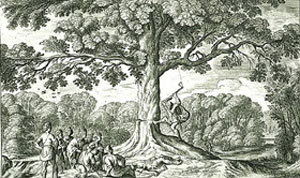|
A story I tell: storyteller Kevin Graal picks Erysichthon and the Sacred Tree

Bauer's engraving of the Erysichthon story |
During our Climate debate, storyteller Kevin Graal mentioned Erysichthon and the Sacred Tree as a story that depicts the repercussions of damaging the forests. "The King consumes himself," said Graal, "It’s an unforgettable image of what we’re doing. We’re consuming ourselves." In the story, the sacrilegious king, Erysichthon (pronounced EreesEEkthon, and meaning ‘earth-tearer’), cuts down a tree in the sacred grove of the Earth Goddess Demeter. The Goddess Demeter calls upon the Goddess Famine to revenge the act. The king is condemned to hunger, selling his own daughter to procure food. Finally, he eats his own limbs until he has consumed himself.
Graal recommends three versions of the story:
The classical source is Ovid's Metamorphoses Book VIII [lines 738-878].
Ted Hughes's version appears in his Tales from Ovid. A.D. Melville translated it for the Oxford University Press’ World Classics Series.
There's also a prose version by the 19th-century American writer Thomas Bulfinch. Briefly, his version is this:
King Erysichthon despised the gods and one day tried to cut down a grove of trees sacred to the Earth Goddess Demeter (Ceres). In this grove there was a towering, venerable oak, on which votive garlands were hung and inscriptions carved expressing the gratitude of suppliants to the nymph of the tree.
But Erysichthon saw no reason to spare it and ordered his servants to cut it down. When he saw them hesitate he snatched an axe from one of them. His first blow hit the trunk, the oak shuddered and groaned and blood flowed from the wound. From the midst of the oak came a voice, "I who dwell in this tree am a nymph beloved of Demeter, and dying by your hands forewarn you that punishment awaits you." At last the tree, suffering repeated blows, fell with a crash.
The Dryads were dismayed at the loss of their companion. They went to Demeter to ask for Erysichthon to be punished. Demeter agreed and planned as punishment that she would deliver him over to Famine.
Demeter herself could not approach Famine, for the Fates have ordained that these two Goddesses should never come together. So she called an Oread from her mountain and sent her on dragons and chariots to the farthest part of ice-clad Scythia, a sad and sterile region without trees and without crops. Cold dwells there, and Fear, Shuddering and Famine. The Oread found Famine in a stony field, pulling up the scant herbage with her teeth and claws. Her hair was rough, her eyes sunk, her face pale, her lips blanched, her jaws covered with dust, and her skin drawn tight, so as to show all her bones.
Famine obeyed Demeter's commands and sped to Erysichthon's bedchamber, where he was sleeping. Famine enfolded him with her wings and breathed herself into him, infusing her poison into his veins. Having discharged her task, she returned to her land. When Erisichthon awoke, his hunger was raging. Even when he was eating he complained of hunger. The more he ate the more he craved. His hunger was like the sea, which receives all the rivers, yet is never filled; or like fire, that burns all the fuel that is heaped upon it, yet still has an appetite for more.
Erysichthon's wealth rapidly diminished under his unceasing demands for food, but his hunger continued unabated. At length, he had spent everything and had only his daughter left. She, too, he sold. His daughter resisted being sent away as a slave on a ship, and prayed to Neptune. He heard her prayer and changed her form into that of a fisherman, deceiving her would-be master. When she resumed her own form, her father was pleased to find her, and sold her again. But as often as she was sold, she was changed by Neptune; now into a horse, now a bird, now an ox, and now a stag, always escaping her purchasers to come home. In this way, the starving father procured food, but never enough for his appetite.
Finally, hunger compelled him to devour his own limbs and he strove to feed his body by eating his body. Only death relieved him from the vengeance of Demeter.
The illustration of Ovid's Metamorphoses by Johann Wilhelm Bauer or Baur (1607-1642)is reproduced courtesy of The Ovid Project: Metamorphosing the Metamorphoses at the University of Vermont, USA.
Ovid (1998). Metamorphoses trans. A.D. Melville. Oxford: Oxford Paperbacks.
Hughes, Ted (1999). Tales from Ovid London: Farrar Straus Giroux.
published in 2006
|
"...Then from the midst of the oak came a voice, "I who dwell in this tree am a nymph beloved of Demeter, and dying by your hands forewarn you that punishment awaits you."
from Erysichthon and the Sacred Tree based on a story from Ovid's Metamorphoses
"The King consumes himself. It’s an unforgettable image of what we’re doing. We’re consuming ourselves." Kevin Graal
|